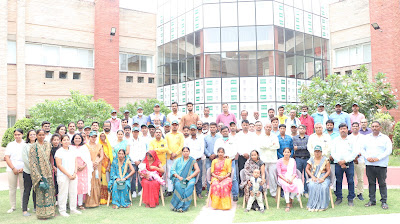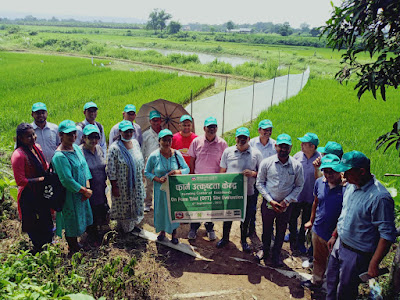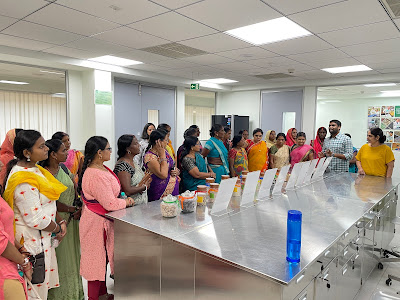The International Rice Research Institute (IRRI)- South Asia Regional Centre (ISARC) organized a capacity development activity on 5 July to promote a sustainable rice production system in India. Farmers and extension workers from Sonbhadra, Uttar Pradesh participated in an orientation which focused on the best agronomic management practices and digital tools.
Wednesday, September 28, 2022
ISARC organizes training on conservation agriculture for rice-based systems to improve paddy production in Madhya Pradesh
The International Rice Research Institute South Asia Regional Centre (ISARC) in Varanasi, India organized a capacity development training program on conservation agriculture on 25-26 July. The training, Regenerative Agriculture Program, was organized for Bayer Crop Science Limited for farmers and technical staff from Madhya Pradesh.
Women farmers and extension agents from Grameen Mitra learn about sustainable rice production systems
Small scale entrepereneurs, farmers and extension agents, including a majority of women leaders from Grameen Mitra Initiative of Grameen Foundation India, participated in a capacity development training, The topics centered around digital innovation, sustainable production technology, and best management practices for rice, which aims to transform the agriculture system in Eastern Uttar Presdesh, India.
KVK-CSISA Network plan next initiatives
The Cereal Systems Initiative for South Asia (CSISA) and Division of Agricultural Extension, Indian Council of Agricultural Research (ICAR) jointly convened the KVK-CSISA network annual workshop at the NASC Complex, New Delhi on September 23. In the workshop, policymakers, scientists, and experts from the Indian Council of Agricultural Research (ICAR), Department of Agricultural Research and Education (DARE), Krishi Vigyan Kendras (KVKs), International Institute of Tropical Agriculture (IITA), International Maize and Wheat Improvement Center (CIMMYT), International Rice Research Institute (IRRI), International Food Policy Research Institute (IFPRI), and Department of Mission Shakti, Government of Odisha discussed and reviewed the KVK-CSISA activities and planned landscape diagnostic survey (LDS) activities for pulses and oilseeds in rice-pulse/rice-oilseed cropping system across India under the network.
Facilitating the adoption of new rice varieties in Nepal to benefit farmers, consumers, and national economy
Farmers, consumers, rice-based agri-food system stakeholders, and, ultimately, Nepal’s national economy would benefit from the faster adoption of new climate-resilient, high-yielding rice by the country’s farmers. To facilitate the adoption of new rice varieties, the International Rice Research Institute (IRRI), Nepal Agriculture Research Council, Agriculture and Forestry University, Agriculture Knowledge Centers, and the Prime Minister Agriculture Modernization Program arranged a field visit and roundtable discussion on 6 September 2022 in Chitwan.
Tuesday, September 20, 2022
MSc Sandwich Research Program Opportunities are now offered to Filipino students
As part of the 6-year capacity building for Higher Education program implemented by the University of the Philippines, Los Banos (UPLB), the International Rice Research Institute (IRRI), and the Korea International Cooperation Agency (KOICA), UPLB now offers Sandwich Research Scholarships for incoming and continuing Filipino MS students that are presently enrolled in the university.
Wednesday, September 14, 2022
Women farmers from Bihar participate in modern rice production training at IRRI South Asia Regional Centre
Forty women from different districts of Bihar, India participated in a modern rice production training designed to equip them with skills and knowledge and empower progressive women engaged in rice-based agri-food systems. Modern rice production technologies was organized by the International Rice Research Institute (IRRI) in partnership with Bihar Agricultural University, Sabour under the Climate-Resilient Agriculture Project of the Bihar State Government.
Held on 24 to 26 August at the IRRI South Asia Regional Centre in Varanasi, the training and capacity development and exposure visit recognizes the contribution of women who make up more than 50% of the total workforce in farming activities in Bihar. However, women farmers often lack the knowledge and skill sets and need to be capacitated to accelerate production, increase their productivity and income, and hasten climate change adaptation and disaster risk management in agriculture.
Through the training, the participants learned best-bet packages for climate-resilient and sustainable rice production, quality seed production and storage, direct-seeded rice as an alternative crop establishment method, site-specific nutrient management, water management strategies in rice cultivation, harvesting and post-production practices for rice, rice-value addition, and the role of women in agriculture and rural development.
The women also acquired knowledge in mechanization and postharvest practices, natural farming, and multiple low-cost bio inputs for improving soil carbon and fertility.
###
IRRI Nepal and FWU train young scientists to strengthen research design and data analytics in the face of climate change
 |
| Participants and dignitaries of the training program at the inaugural session in front of Faculty of Agriculture, FWU, Tikapur, Kailai |
A five-day training entitled “Robust experimental designs and smart statistical tools for rice research in the face of climate change” was held from August 29 to September 2 at the Faculty of Agriculture, Far Western University (FWU), in Tikapur, Kailali, Nepal. The event was co-organized by the International Rice Research Institute (IRRI) and FWU with the objective of transferring critical skills on research design, data handling, processing, analysis and scientific writing.
Labels:
Faculty of Agriculture,
Far Western University,
FWU,
Robust experimental designs,
smart statistical tools
Monday, September 12, 2022
One IRRI-NARES Rice Breeding Network launches in India to enhance genetic gains in South Asia
South Asia, for years, has been trying to tackle different challenges in their agrifood system. Some of these challenges are identifying genetic resources, mapping traits for drought, salinity, and submergence tolerance, as well as identifying grain quality requirements based on the market demand in South Asia. As a response, plant breeders at the International Rice Research Institute (IRRI) and national agricultural research and extension systems (NARES) convened to launch the One IRRI-NARES Rice Breeding Network Team-South Asia in India.
Tuesday, September 6, 2022
IRRI Education opens three courses on rice research, breeding, and sustainable cultivation
The International Rice Research Institute (IRRI) Education opened on rice research and production, rice breeding, and sustainable rice cultivation.
The Rice Research to Production (RR2P) face-to-face course kicked off on 05 September at the IRRI headquarters with 69 research and extension staff of the Department of Agriculture (DA), DA attached agencies, local government units, and state universities and colleges participating in the 5-day training. The program is part of the fourth rollout of the RR2P course, which started on 27 June, where the participants will get to apply what they have learned from the online component of the course under the guidance of IRRI’s resource experts. This RR2P program is under the DA-IRRI project, Strengthening the capability of the national research for development and extension partners for research, development, and extension of information and technologies to improve productivity and resilience of rice-based farming communities in the Philippines.
Labels:
IRRI Education,
rice research to production (RR2P),
RR2P,
srp
Subscribe to:
Comments (Atom)










